Occupational change: How Delta Community Developed other Professions from Fishing to Survive due to Oil Spill
by Israel Olatunji Tijani
Substantive local news is a rare commodity in many communities across Nigeria. In areas with high levels of violence, crime, and poverty, a history of stigmatization can further compound this absence. Often the only local news available is negative.
In a journalistic environment where the mantra “if it bleeds, it leads” continues to resonate—and is amplified ever more by the clickbait web—there is a professional bias in favor of reporting on kidnapping, insurgency, banditry, police brutality, and other negative tropes.
But how do audiences process and react to stories about their communities presented within negative frames? How would stories that address these systemic problems—while also exploring their solutions inspire readers? The answer to the latter question is Solutions Journalism.
Freshwater capture fisheries in the Lower River Niger Basin provide 47 to 80 percent of the animal protein consumed, as well as livelihood opportunities on a large scale for the neighboring settlements.
However, in the absence of a solid estimate of the total economic value of these fisheries, their importance remains very poorly recognized by institutions and in development plans, which hampers rural development. Furthermore, the respective role of fish and agricultural resources in livelihoods and in rural welfare has never been quantified.
Economically, fishing on the lower Niger River has the potential for growth into large industries down the value chain that could lead to wider business networks in terms of supply services, fishing, and marketing which could provide job opportunities to the teaming populace. It could also provide investment opportunities in feed mills, equipment manufacturing, processing, packaging, and the provision of raw ingredients for research and education.
PAY ATTENTION: Share your outstanding story with our editors! Please reach us through info@corp.legit.ng!
The fish industry also provides an alternative source of high-valued animal protein needs, contributing over 60percent of the total protein intake of the rural population. Fish has a nutrient profile superior to all terrestrial meats and equally has high digestible energy that can meet the nutritional requirements of the body.
In Nigeria, commercial fishing on the lower Niger River started over 50 years ago. Meeting the fish protein demand of the current population of over two hundred million people in Nigeria may require over 3 million metric tons of fish. Even with aquaculture, production is currently only 1,073,059 metric tons (313,231 metric tons from aquaculture and 759,828 metric tons from fisheries).
The consumption of nearly 19.38gms/output/day is low and far below the United Nations Food and Agricultural Organization (FAO) recommendation of 65gms/output/day.
The Niger Delta alone in the lower Niger River contributes more than 50 per cent of the entire domestic Nigerian fish supply, being blessed with an abundance of both fresh, brackish, and marine water bodies that are inhabited by a wide array of both fin fish and non-fish fauna that supports artisanal fisheries.
The Niger Delta is also naturally blessed with numerous cash crops, a cash crop is grown for sale to return profits either by its direct usage or derivatives.
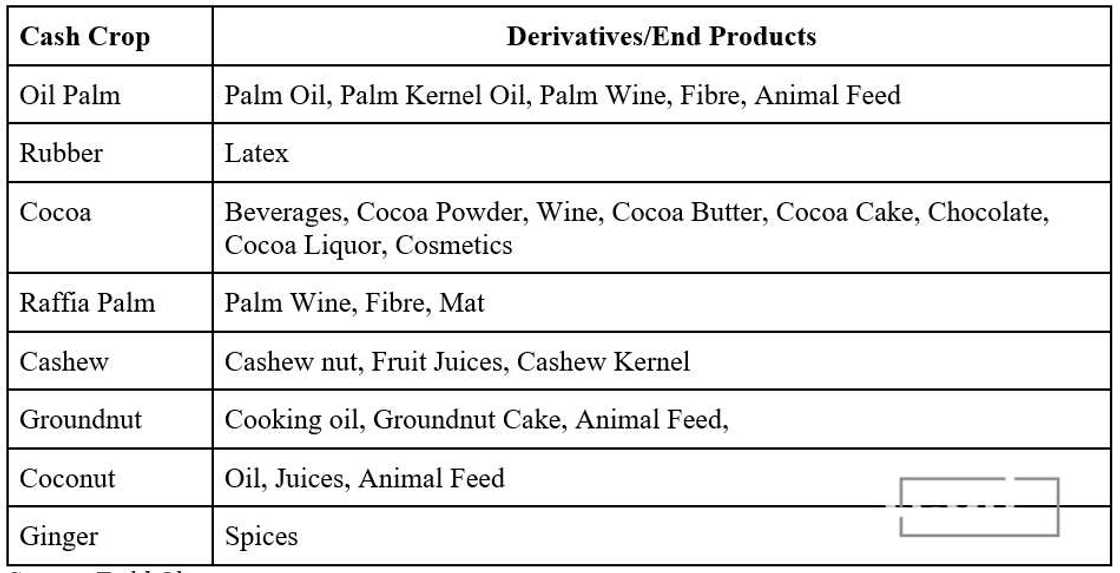
Source: Original
Delta State is in Nigeria - some 265 miles or (426 km) South-West of Abuja, the country's capital. It is situated around 5° 25' 24'' N, 6° 1' 30" E on the World Atlas. Delta state boasts of a workforce group that is over 58 percent of its entire population according to the 2006 census.
Sapele local government area is found in Delta state, South-south geopolitical zone of Nigeria. The LGA is made up of several towns and villages such as Elume, Ugborhen, Amukpe, Ogiedi, Onoghro, Okuoke, Inabome, and Amuokpokpor. The estimated population of Sapele LGA is put at 298,310 inhabitants with the LGA mostly populated by members of the Urhobo ethnic group.
The Urhobo language is commonly spoken while the religions of Christianity and traditionalism are widely practised in the area. Notable landmarks in Sapele LGA include the Sapele sports stadium and the Sapele Port. The surrounding forest especially features Entandrophragma cylindricum, commonly called Sapele after the town.
Fishing and agriculture are the main occupations of the people of Niger Delta, especially in the wetland area of the region like Amuokpokpor-Elume which is the predominantly fishing community in Sapele. Amuokpokpor-Elume is a riverside community whose livelihood and source of revenue rely solely on fishing and its derivates.
The sudden fall from grace to grass
“Na hunger we dey”
In February 2022 the community woke to a devastating loss of flora and fauna due to oil spills from the wellhead operated by Conoil, the community lost its major source of income and economic livelihood. Decades of oil prospecting and exploitation have blighted the Niger-Delta communities, leaving the inhabitants in pitiable conditions with their means of livelihood washed away. A lot of households have slipped into poverty and many whose source of revenue comes from fishing to fund the education of their children could no longer afford to pay their school fees leading to them dropping out of school.
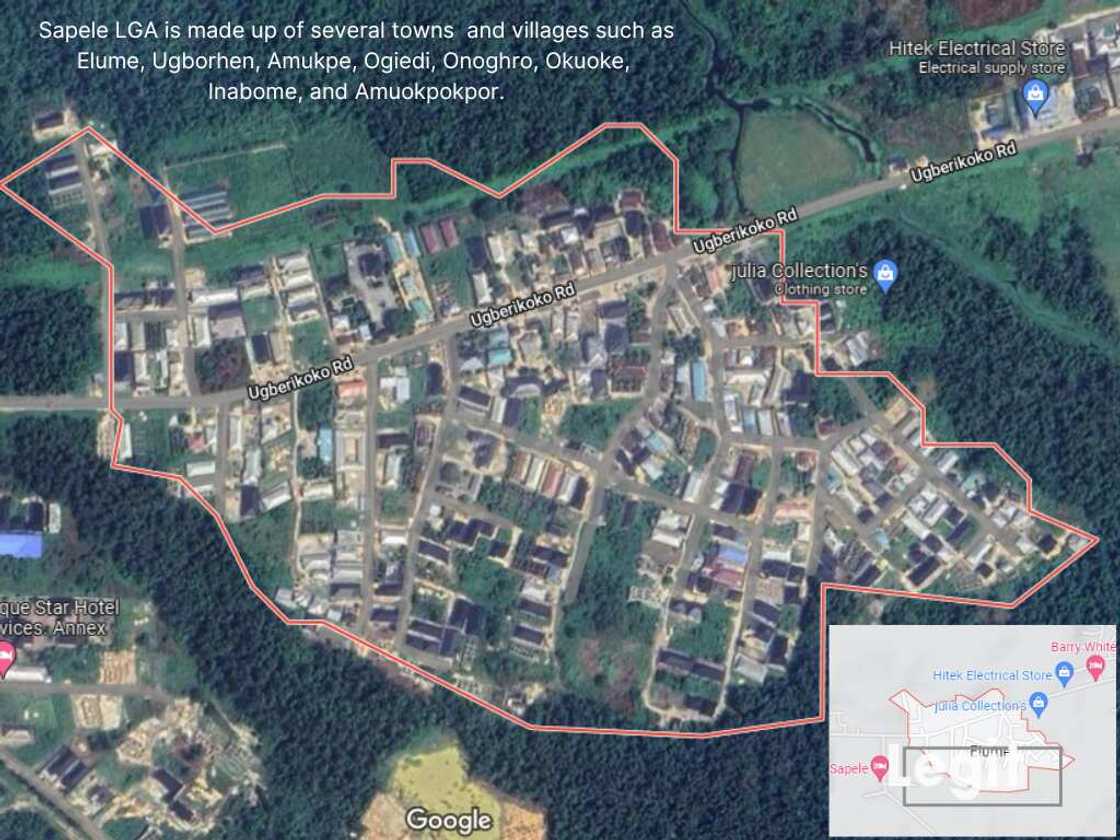
Source: Original
Mary Youngman (middle) makes 50,000 naira per day from selling a sack of periwinkle, but after the spill “I can’t even eat again, na hunger we dey” she lamented.
From left: Elizabeth Azu, Mary Youngman and Endurance Edam work as a team picking periwinkle on a commercial scale, they pick up to three sacks of periwinkle daily. Jointly they make an average of 150,000 naira. The people of Amuokpokpor use the periwinkle shell for building instead of the very expensive granite. Periwinkle shell is mixed with sand and cement to make a very strong concrete used for pillar, lintel and conduit. All these are now in the past.
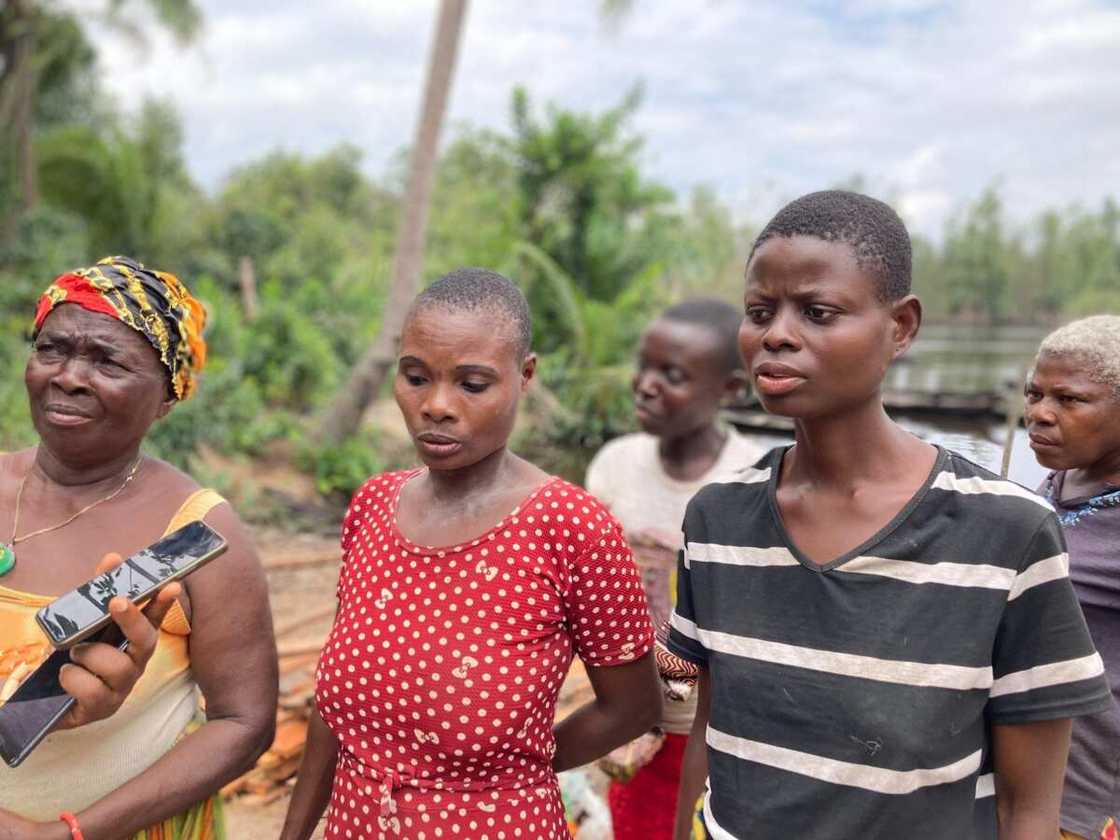
Source: Facebook
The community councilor, Hon Azu Sam from ward 18 of the indigenous fishing folks in Amuokpokpor-Elume, said, “we are in deep water” as they could no longer engage their occupation as a result of the colossal pollution of the Amuokpokpor river.
The community leaders took bold steps by writing the state government and other concerned stakeholders in the Ministry of Environment but did not get any response. The community which is mostly impacted by the spill was not visited.
In the account of the impact of oil spill on their livelihood, he narrated how oil extraction has impacted most disastrously on their socio-physical environment in Amuokpokpor community, oil bearing communities massively threaten the fragile subsistent peasant economy and biodiversity and hence their entire economic livelihood and very survival. The socio and environmental costs of oil production have been extensive. They include destruction of wildlife and biodiversity, loss of fertile soil, pollution of air and drinking water, degradation of farmland, and damage to aquatic ecosystems, all of which have caused serious health problems for the inhabitants of the areas surrounding oil production.
The occurrence of oil spills in Nigeria is frequent. Recall in February 2001, oil spill was reported in Ughelli which led to pollution of the water, thereby making it not navigable for fish and carrying out economic activities and loss of aquatic lives in the river.
In 2021, there were around 386 publicly available oil spill records. 120 of these had no estimated quantity of oil spilled provided by the company.

Source: Facebook
Based on reports available 23,950.271 barrels of oil (3,784,142.864 litres) were spilled. That is around 120 oil tanker trucks full. The Niger Delta has witnessed untold environmental damage and many traditional livelihoods have been ruined from oil spills.
Taking destiny into their own hands
“The past explains how I got here, but the future is up to me”
How did they respond? The community came together to devise a way forward as they could not wait forever on the government for intervention and clean-up is not going to happen anytime soon. They decided to diversify by engaging in other lucrative and sustainable occupations. In the white-collar setting, this is called career change. They shifted focus from fishing, their choice of occupation which some families have passed down from generation to generation, and engaged themselves in tapping rubber trees, growing cassava, and tapping palm oil called “Banga” in local parlance. The community leaders put their heads together and identified other lucrative professions the community can venture in. Members of the community opted for different occupations based on prior skills, resources, and technical support available.
The “howdunnit” narrative of one fisherman turning rubber tapper revealed the technicality involved to tap rubber for a living. Rubber tapping is one occupation that requires technical know-how, it is the process of extracting latex from a rubber tree. The latex is harvested by slicing a groove into the bark of the tree at a depth of one-quarter inch (6.4 mm) with a hooked knife and peeling back the bark. Rubber trees must be approximately six years old and six inches (150 mm) in diameter in order to be fully ripped for latex tapping.
Rubber tapping is not damaging to the forest, as it does not require the tree to be cut down for the latex to be extracted. The latex that flows out from the rubber trees on tapping is channeled into a container and then transferred to clean buckets.
According to him, it must be done carefully and skillfully for the tapping panel to yield latex for up to five hours. Then the opposite side will be tapped, allowing this side to heal over.
The 54-year-old wakes up as early as 6 am and heads to the forest to tap rubber before the sun is up. He removes a thin layer of bark along a downward half spiral on the tree trunk with a knife. The spiral allows the latex to run down to a collecting cup. The work is done with time conscious before the day's temperature rises, so the latex will drip longer before coagulating and sealing the cut. He taps from Monday to Saturday and collects the latex on Sunday. After collecting the latex, he then adds starch water to make it congeal. This procedure makes the latex solid and does not break when scaling during sales.
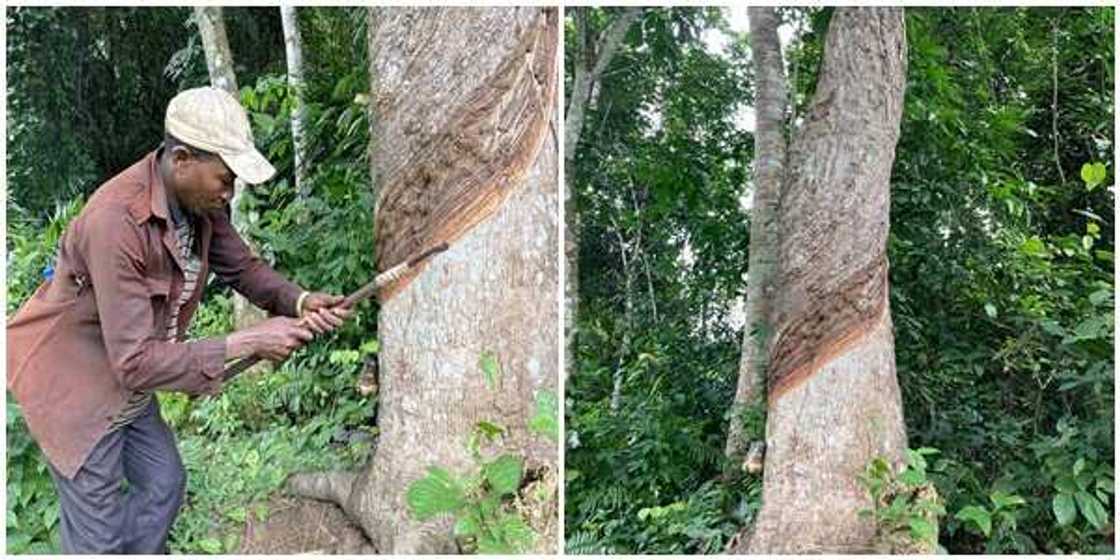
Source: Facebook
Currently, 33.3 percent or 23.2 million of the about 70 million people who should be working in Nigeria are out of work. An acceptable level of unemployment would be between 4 - 6 percent. Nigeria cannot afford more of its workforce out of jobs due to recurring oil spill. The country’s underemployment rate – people who work less than 20 hours a week – is also high at 22.8 percent.
No system is perfect
“We are working more and earning less”
Self-developing oneself in a new skill to survive at old age is tiring, in fact, it looks almost impossible. Lack of passion, lack of appropriate tools, and professional trainer all contributed to the limitations facing the people of Amuokpokpor’s response. Their new line of occupation is not bringing more income as they used to earn from fishing activities.
Amuokpokpor people now earn between 5,000 to 6,000 naira per week from tapping rubber.
Igeleba Festus, a 43-year-old father of six said he risks losing his life as a banga tapper if he should fall from climbing palm tree. On several occasions, he has had an encounter with snakes on top of the palm tree. He is still learning to use the climbing rope as he opted for a new source of livelihood.
“My father trained me how to swim and fish, fishing is less risky compared to tapping palm oil,” he said as the risk attached to his new source of income weighed on him. Festus engaged himself in two other occupations: tapping rubber and palm oil. To feed his children and send them to school with daily earnings of about 2,000 naira from tapping banga is a problem as he could no longer tap rubber due to rain. He has a daily income shortfall of about 13,000 naira. This is not unexpected given the limitation as a degree of adaptation to their new survival skills and the fact that artisanal methods of production are employed.
Esther, a mother of 7 children has been into fishing for 10 years, she makes around 15,000 – 20,000 naira per day from this occupation before the oil spill. Out of suffering and hunger she transited into growing cassava to continue supporting her family. She now makes around 5,000 naira per week from cassava harvest. She spoke on the difficulty that comes with the new occupation she transited into; farming is now her new choice of occupation nevertheless her survival attracts some hardship.
She emphasized that the technique required in fishing is different from that of growing cassava. Esther is still learning some skills needed for her to master farming through self-development and trial by error. Sometimes when the polluted river overflows its bank and enter her farmland, all the cassava she planted got destroyed, and all effort is washed down the drain. Tilting the ground is difficult compared to fishing for a woman but she just must continue doing it to survive. She describes the damage done to crops as seen in her fishing cage. The effect of the oil spill has turned one of the cages black.
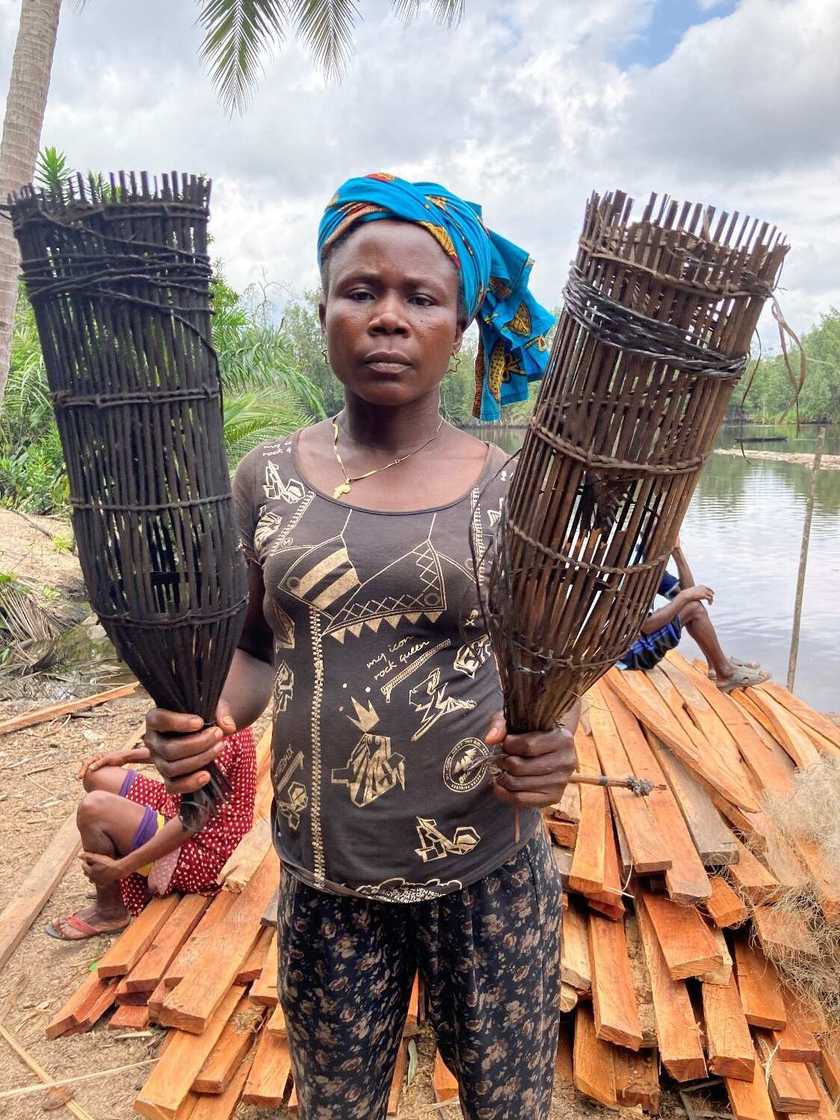
Source: Facebook
Measuring impact
“Half a loaf is better than none”
The entire community is keeping hope alive. Adaptation is key to survival. Building resilience has given the residents a reason to work together, support each other and develop capacity in new occupations.
As tough and little as it may be, while waiting for government intervention to clean up they continue to earn some amounts. Self-development by learning on the job will continue to pay off. They have engaged themselves in other occupations instead of being idle which might tempt them into dipping their hands into illegal and criminal activities.
From zero revenue to an average
As evidence of impact, a survey was conducted on the socio-economic impact of their new occupations, the amount of income realized from respondents compared to farming revealed that farm income is low, but half a loaf is better than none.
From zero revenue to a weekly farm revenue ranging between ₦75,000.00 to ₦180,000.00. The average weekly income is ₦45,717.20.
A relatively moderate household size was found in the study, with a mean size of 6.5 persons per household. Though a very large family size may constitute a social burden, larger families use their labour input to advantage in commercial farming and forest product exploitation.
The mean level of educational attainment is 3.00 and the implication of this is that on average means every farmer in Amuokpokpor-Elume had a secondary school education.
This story has been made possible by Nigeria Health Watch with support from the Solutions Journalism Network, a nonprofit organization dedicated to rigorous and compelling reporting about responses to social problems.
Source: Legit.ng


